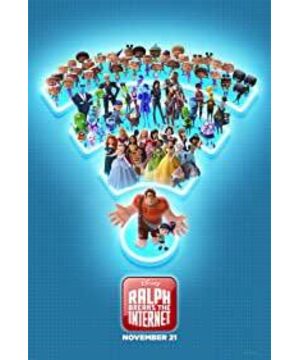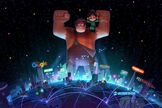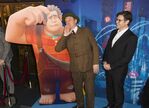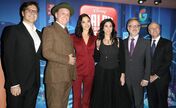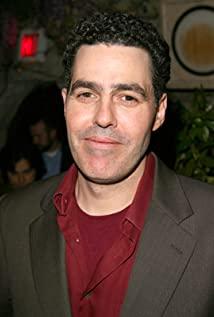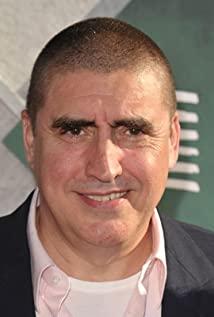This article can be found in the official account
Deep Focus: Interpretation of "Invincible Destruction King 2"
Fengying Films: Interpretation of the deep meaning of "Invincible Destruction King 2"
If the world view of the first part of "Invincible Destruction King" is a kind of ancient collage of "game hall + LAN", then when "Invincible Destruction King 2" comes to the real information age, the audience has already changed from a kind of The fairy-tale dislocation of time and space transitions to a more real world.
Therefore, when watching the first movie, the audience may be able to put aside the complex references of reality (mainly manifested in the insurmountable class divisions and the protagonist Ralph's strict life choices), and they are completely indulged in the nostalgia and fantasy created by the film. Atmosphere. So when I came to the second Internet with a richer personal experience, those life experiences with subtle anxieties were easily inspired. Although this series of carnival comedy animations are as radiant as ever, the dark background behind them is even more intense.
In the more expansive and glamorous online world, Ralph, whose function of "destruction" no longer has a place to put himself, obviously this sequel does not have a perfect ending as before. It became his "Network Lost" and even more so The creator's melancholy look back at the "reality" in the "virtual".
"Virtual" or "Reality"
Although "Invincible Destruction King 2" will inevitably be compared with the same popular "Number One Player" at the beginning of the year, in fact there is a huge difference in the worldview constructed by the two.
In "Top Player", the relationship between virtual and reality constructed by Spielberg is very clear : technology is a real force, and the virtual world is created and defined by technology; the struggle in the virtual world is a reflection of the struggle in the real world; Conclusion: Defend the purity of the virtual world, but not abandon the real world.
We seem to be able to get a vague life truth of "return to reality" from the joke at the end. But in fact, as a kind of existence separated from reality, the virtual made by technology has cut the actual life time. In this way, the world view of "Top Player" is that "virtual" and "reality" are completely dichotomy, and the ending is a one-way control of "virtual" over "reality".
"Invincible Destruction King" is obviously different.
In the first part, the film is basically a completely closed virtual world. It does not insist on distinguishing between virtual and reality, but embeds the complex relationship of real life in the characterization and relationship of the virtual world, so that non-players can also get ample emotional commonality and game experience.
In the second part, this complex entangled relationship between virtual and reality is brought to the audience more closely in the network imagination. As a "virtual" protagonist in a closed program, he accidentally falls into this cyberspace that has a more direct interaction with "real". Is the network real or virtual? How to distinguish whether the protagonist's actions are virtual or real? The creator did not directly give a standard answer from the beginning to the end, but through the rich plot and imaginative technological visualization, leading the audience to reach the knot of contradictions, hesitation, and loss, and explore the relationship between the two.
"Virtual" as a representation of "reality"
The basic framework of the film’s worldview is indeed designed according to the process of network technology, but the creators also reflect the same logic of reality in the virtual world in a variety of details. These interesting ingenuities not only serve as the appearance of the real world, but also tear open the gap between the "virtual" and the "reality" from another twisted perspective.
The most basic is the setting of "species" in different worlds . In the first part, the humans outside the game console are obviously more "real" than the characters inside the game console. In the second part, the "human beings" in the online world are constructed as a group of square-headed objects. They have fixed expressions, neat movements, and much lower athletic ability than the real world. Ralph and Vanellope, as characters in the virtual world that have gradually become obsolete, are much more vivid than those from the real world. And at special plot points, such as when Ralph needs more likes, these real-world humans are completely controlled by the characters in the virtual world. They can't choose where they are going, they can only watch passively and give out the "likes" in their hands. .
At this time, we see a point that is completely different between the Internet world and the game console world. In the game hall, the uncontrolled steering wheel shows more of a "fantasy" style; and in the Internet, this state of user manipulation is no longer a fictional bridge, but an objective reality under the control of big data. , This is a kind of "science fiction" color derived from a solid reality basis. The kind of dolls that are unified into a square-headed small torso by the Internet world also vaguely fits the single state of people being gradually assimilated by data technology.
Also interesting is the space setting of the film , which is also closely related to the division of labor between virtual characters in different spaces. On the surface of the online world, we see a bright and orderly prosperous picture of "people" flowing like weaving. The most representative one is undoubtedly the short video App community. All real-world users flocked to the center of the video tower to sing and dance to give each "like", the whole hall is like a stock market with jubilation and passion-although the moment of like in real life may be just a few tiring traces Just wry smile. And sister Zan, who controls the algorithm, is just a manager who views Ralph in terms of the number of likes and traffic rankings and pursues the efficiency and benefits of the company's operation.
In the square outside the tall buildings, what we see is the same mixed crowd as real life. The pop-up people who are working around with billboards are like we have seen countless flyers or English course salesmen in subway stations and shopping malls-but they are more efficient and not tired as programs. Enthusiasm for work. In the story, he not only took us into the shanty town of a spam advertising website not far from the surface, but also directly reached the dark web buried deep in the ground, and this dim, narrow area indirectly triggered the final huge crisis. .
The efficient and clean operation of the Internet’s surface seems to only cover the deep surging undercurrents. The underground society characterized by filth, disease and destruction is not external to the Internet, but a part of this huge system full of contradictions. The identity crisis of the "good guys" and the "bad guys" in the first part is once again presented through a larger space setting.
Therefore, our protagonist Ralph will definitely go through a decision again, but this time the decision also has its own unique way of fermentation on the Internet.
"Virtual" anti-customer-oriented
Ralph has been an outlier in the game system since the first installment. As a virtual fixed program, he is unwilling to be confined to the position of the "bad guy", so he opens a journey across spatial isolation. After a whole set of crises broke out and resolved, although he did not change his bad guy settings in the game, he also gained the respect of others in his community.
Accompanied by Ralph’s “doing one line and loving one line” workplace chicken soup, Vanellope, as the once noble princess of Sugar Rush, has completed the natural transformation from the upper class to the “mortal” very naturally. In such an easy life situation change, Vanellope may never really understand the difficulty of Ralph as an ordinary person defined as a "destroyer" who wants to be a "good person".
Ralph's purpose is very simple from beginning to end, and that is to help Vanellope rebuild outdated games. Although he once yearned for a different life, as a virtual character in the old age, he relied on a sufficiently stable local game space. In a game hall with few changes and many restrictions, the interdependence between him and Vanellope can exist for a long time in a stable way -even if this connection can only be achieved by looking at each other far away.
As a program, on the one hand he has to exercise the set rules, on the other hand his "anthropomorphic" real emotions are not accommodated by the program itself. Therefore, as a "destroyer", helping to "fix" the procedure-that is, finding the steering wheel is his biggest way to bridge this gap.
Therefore, when Vanellope refused to return, for Ralph, the existence of the steering wheel also completely lost its sense of direction. His side as a non-procedural "person" was deprived of a large part by Vanellope's departure. The program that holds actual control in the virtual world not only limits his position in the game hall, but also takes Vanellope away from him in an advanced technological manner by giving Vanellope a seemingly broader life choice. His anger was not that Vanellope was "poisoned" as shown in his lines, but because if Vanellope left, the good "human" life he had built up with a complete experience would collapse.
Audiences who have watched "Brain Agents" must not be unfamiliar. This kind of "angry" sense of loss and deprivation is normal for a real ordinary person. But what is intriguing is that just as the "earth-flavored video" of an outdated villain can be remembered, mocked, watched, stared at and finally amassed a lot of wealth by the Internet in the new era, Ralph's natural "humanity" in the face of lost emotions ", it can also be easily captured by programs in the Internet world and magnified into a terrorist crisis.
The empty Ralph was judged by the virus as a 100% vulnerability, and multiplied indefinitely enough to engulf the entire Internet. At this time, Ralph’s "destructive" attribute and the inherent destructiveness of the Internet program quietly overlap, and the flaw projected by this loophole is a deeper level of fear and anxiety that permeates the entire Internet -this anxiety is not earned all day long. What can be expressed by Sister Zan of traffic, Sister Shan with the highest standard of game ability, and Mr. polite search engine, it is hidden in the hostility of the comment area, buried deep in the desire for destruction of the dark web, It penetrates the screen and maps to the fatigue, tension and boredom of all real humans who use social networks.
To a certain extent, such a huge “destruction” is not an accident under a specific condition, but rather the inevitability of the real “people” who urgently need to be released and relieved under the rule of the virtual network technology under the rule of the Internet. It is emotion. The fundamental conflict between being suppressed and the efficient operation of rational procedures. The ghost of Ralph, who has filled the entire cyberspace with Mimizaza, is not the "king of destruction" that people fear, but the anxiety of everyone in cyberspace itself. Like Ralph, people think that they have gained the greatest degree of freedom on the Internet, but they cannot break away from this fundamental program structure.
Ralph encountered a more difficult problem than in the game hall.
He once thought that he could gain the same social recognition as a "bad guy". His ability to destroy brought the Coromantos lighthouse that burst out in the first film, which was a solution to the life crisis of Vanellope. It was life. Re-look and unfold the way. Here, "destroy" has the power to repair and rebuild on the other side.
However, to the Internet world with more rigorous procedures. His "destruction" has lost its effectiveness, and he can only be resolved and corrected as a disaster, a mistake. His abilities were solidified again, and his conflicting side with the program could already be corrected and buried by the program —just as the dark web and pop-up windows were suppressed underground.
This is no longer something that an old-time program/"person" like him can do to save himself. Continuing to look at Vanellope from a distance through the videophone is his only self-consolation.
Virtual programs and real people blend together in Ralph. But the highly developed Internet programming logic fermented the emotions of this real overflowing person and practiced it into a grand performance of self-repair. In the end, the positive aspect of "destruction" can only continue to exist in the game hall, and the virtuality of the Internet has swallowed up the needs of real people.
Re-examination of "reality"
From the above analysis, it is not difficult to see that the perspective of "Invincible Destruction King 2" has been reversed.
It first assigns the characteristics of real-world people to "programs", allowing the audience to resonate through the attributes of "people". Looking back, starting from the fusion of virtual and reality characters, the audience is able to reflect on the self-personality in life. The process of refining the internal logic of the virtual world is also a process of completing the description of the external world. Numerous and complicated interactions have occurred between virtual and reality.
The virtual world is no longer a purely procedural, rigid, and neutral tool for human manipulation, and the human real world is no longer a fully active and substantial subject. The virtual world not only becomes the projection of human society, but also controls people themselves through the ruling logic of human society; human emotions are virtualized in the virtual world, and they also react to reality after being processed and manipulated.
In the process of "virtual" anti-object-oriented, the creator is not limited to the fascination with the virtual, but has completed the re-examination of the real world. When the boundary between virtual and reality is gradually blurred, the value judgments of "false" and "real", "progress" and "backward", "rational" and "perceptual" will inevitably face the same loss, the story of "net lost" It must be a re-identification of these levels of duality-even if it is just an attempt to imply pessimism.
At the end of the film may be the darkest animated feature easter egg.
The rabbits fed by Enron in the children's mini game can only eat muffins according to the regulations of the program. When Ralph came to make trouble, he was forced to eat countless muffins. The movie finally concealed the messy blood in the virtual world with the little girl's scream.
What about human beings in reality? When human beings are limited by the data rules of the Internet, they can only eat the information "muffins" given by countless algorithms. Can they say "no"? In this game between people and programs, what will their end be?
View more about Ralph Breaks the Internet reviews


